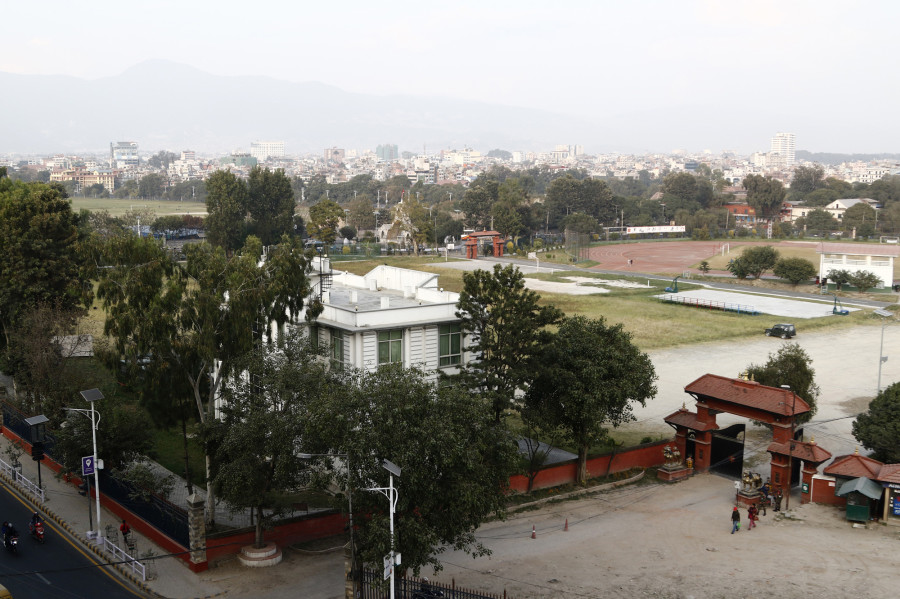Valley
Occupy Tundikhel hopes to reclaim the public spaces that are being encroached upon
Hemmed in on all sides, Tundikhel, which was once nearly four kilometres long, is a fraction of that size now.
Anup Ojha
Tundikhel, described by many as the ‘lungs of Kathmandu’, was once a wide-open expanse in the heart of the city. This public park once spanned nearly four kilometres, all the way from Rani Pokhari to Dashrath Stadium. But ever since the Rana era, successive governments have consistently chipped away at this prime land, cordoning off portions for private parks, roads, and for the exclusive use of the Nepal Army. Now, Tundikhel is barely half its original size, hemmed in on all sides.
Locals and activists have long protested this encroachment on an open space that has been so vital to the city, not just for recreation and leisure but also for relief and as staging ground during the earthquakes that have periodically struck Kathmandu. But the appropriation of public land has continued unabated.
A coalition of locals, environmentalists and heritage activists has had enough. On November 9, they are launching Occupy Tundikhel, a mass awareness campaign aimed at building public pressure to reclaim the space.
“This will be an apolitical movement. We want to tell the masses how our open spaces are being encroached upon and why they should be preserved,” said Vijaya Shrestha, coordinator of the Occupy Tundikhel campaign.
Shrestha was born and raised in the nearby Janabahal and has fond memories of playing in Tundikhel as a child, which is why he is personally invested in the campaign, he said.
“Tundikhel is our heritage. It is public property, and it should be protected for generations to come,” said 51-year-old Shrestha.
Tundikhel, one of the largest and most important of the Valley’s 83 open spaces, is currently partitioned off into Khula Manch, a 48-ropani open theatre, and the public grounds. In 2016, Kathmandu Metropolitan City had contracted Jaleshwor Swachhanda Bkoi Builders to build a view tower in the old bus park, leading the bus park to move to Khula Manch. The theatre space is now a parking lot for buses and an informal dump for construction materials.
In late April, Manoj Bhetwal, the owner of Jaleshwor Builders, had rented out the remaining open space to 50 temporary businesses. After a vocal protest, the city demolished the illegal structures.
“Tundikhel and Khula Manch have cultural value because these open spaces are associated with many Newar jatras,” said Ganapati Lal Shrestha, a conservationist. “This space has given birth to politicians, but now it is itself under threat of political influence.”
The Nepal Army has also occupied a significant portion of Tundikhel, placing barbed wires across nearly half of the grounds and closing it off to the public. Although previous attempts to negotiate with the Army have not gone well, the administration said it was open to working with the public.
“If conservationists come up with a clear concern, we are ready to coordinate with them,” said Brigadier General Bigyan Dev Pandey, the Army spokesperson. “Our purpose is to serve the people based on the government’s decisions, and in the past, we have worked for greenery and open space.”
The Occupy Tundikhel campaign will see activists forming a human chain around Tundikhel, along with a series of events such as street plays, cultural processions, paintings, and poetry recitations, according to the organisers.
“This is a public event to preserve the lungs of our city. From the first day, November 9, which is observed as International Freedom Day, we will announce a series of other activities, until our concerns are addressed,” said Alok Siddhi Tuladhar, heritage conservationist and one of the organisers. “We are not going to raise funds or spend any specific amount of money for this event. The campaign hopes to include public figures, celebrities, sports icons and media persons in order to raise awareness.”
According to the organisers, they are even reaching out to President Bidya Devi Bhandari to gain political support.
Bhimsen Das Pradhan, a Member of Parliament from Kathmandu Constituency-6, said he has raised the issue of Tundikhel being encroached upon with Mayor Bidya Sundar Shakya on multiple occasions.
“I have even taken up the issue with President Bhandari,” said Pradhan, 62, a Kathmandu native who grew up playing in Tundikhel. “If the government fails to regain the lost portion of Tundikhel and work to protect the remaining space, people will one day reclaim it on their own. After all, it’s public property.”
Shrestha, the conservationist, hopes the Occupy Tundikhel campaign will also send a message to the land mafia that the public will not let them use any public space for their own benefits. “This is a voluntary movement to bring back our lost open spaces so that our children and grandchildren can breathe clean air,” said Shrestha.




 19.12°C Kathmandu
19.12°C Kathmandu.jpg)












